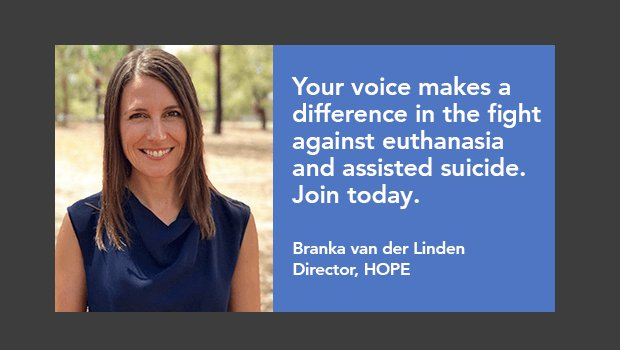Branka van der Linden’s latest double-Whopper

I haven’t written for a while, but was prompted to do so by my friend and colleague Ian Wood. He pointed me to an email just sent about by Branka van der Linden of the anti-VAD “HOPE” blog site.
I've written about Ms van der Linden's musings before, including:
- 'HOPE' continues to pedal egregious misinformation
- Grotesque Catholic propaganda about Belgium
- 'Inhumane deaths': from unsubstantiated claim to full-on polemic
- Hiding their religious petticoats
- Anti-VAD suicide gaffes a major embarrassment
What’s the big deal?
In her email, Ms van der Linden wrote provocatively against the Netherlands’ voluntary assisted dying (VAD) law, citing a recently-published medical journal study of Dutch VAD cases that involved people with intellectual disabilities or autism spectrum disorder (or both). The study is a legitimate examination of cases published by the Dutch Euthanasia Commissions, and contains numerous observations and some qualifications.
The first whopper
Mr van der Linden cherry-picks a single item from the study — that a majority of qualifying cases examined reported feeling socially isolated and lonely — and presses that into strong emotional words about “not caring” for people.
She failed to identify any other important aspect of either the study, or Dutch law, including:
- The article reported that two thirds (67%) of the cases had profound somatic (physical) conditions as well. Comorbidities are very common in Dutch VAD cases.
- The Dutch law requires:
- The request to be well-considered
- The patient’s suffering to be lasting and unbearable
- The patient to be fully informed
- The patient holding the conviction that there was no other reasonable solution, and
- The attending doctor consulting a second doctor who also furnishes a written opinion about the qualification criteria.
So much for context and balance.
And she goes on.
The second whopper
Ms van der Linden then categorically and confidently states that:
“Like every other country that has legalised euthanasia, the debate in the Netherlands was initially about euthanasia for those with terminal illnesses. That has now shifted to approving requests for euthanasia for people with autism. This is the inevitable trajectory once a jurisdiction approves euthanasia laws.”
So much hyperbole. Let’s examine the facts:
- Netherlands: The Dutch VAD law was legislated in 2001 and came into effect early 2002. It allowed non-terminal cases (including psychological) to qualify right from the outset.
- Netherlands: Prior to the legislation, there was a period, from the 1980s, where VAD was approved by regulation (not legislation). Was that for terminal-only cases? Nope. Right from the outset, Dutch law permitted non-terminal cases.
So, Ms van der Linden’s claims about the Netherlands are foundationally false.
Now, on to the “inevitable trajectory” claim.
- Belgium: Changed from terminal-only to non-terminal? Nope. (Non-terminal from the outset.)
- Luxembourg: Changed from terminal-only to non-terminal? Nope. (Non-terminal from the outset.)
- Switzerland: Changed? Nope. (There have been no statutory qualification criteria since 1942.)
- USA states: Any of the lawful USA states, including Oregon where VAD law has been in effect since 1997, changed from terminal-only to non-terminal? Nope.
- Australia: Any state changed from terminal-only to non-terminal? Nope.
Ms van der Linden’s claim is contradicted by so much evidence.
- Canada: There is one notable jurisdiction where qualification criteria have changed, and that’s Canada. Changes have been many years in the making, involving nation-wide conversation and debate, steered by its legislature and most senior court. Many points have been thrashed out as representatives consider the issues and settle on what a majority of the nation's own citizenry (not Ms van der Linden) believes is appropriate.
Importantly, it’s worth noting that even with additions to qualification criteria set in law in Canada, they are still considerably more restrictive than in Switzerland — because Swiss legislation doesn’t stipulate any qualifying criteria. Yet Switzerland’s assisted dying rate is lower than Canada’s. It’s a cultural difference.
Changes to qualification criteria are very much the exception, not “inevitable” as Ms van der Linden wrongly states.
Two claims — both whoppers
It’s hard to imagine that Ms van der Linden, being so immersed in the VAD subject as she is, could be so unaware of the most fundamental facts. But maybe she is, despite the facts being easy to source. Such ignorance renders her an “unreliable witness”.
To my mind, repeatedly failing to establish the actual facts while confidently stating “counter-facts” that are not true — especially in order to influence others in support of one's personal ideological position — would be consistent with an impoverished sense of ethics.
Conclusion
I admire and respect Ms van der Linden’s passion for doggedly pursuing what she believes is right, and I’m thankful we live in a robust democracy that allows people to express and debate views consistent with their internal values.
What, I argue, isn’t worthy of admiration or respect is to repeatedly misinform one’s audience by failing to undertake the most basic checking to determine if what one is saying is fundamentally true, let alone balanced or contextually relevant.
